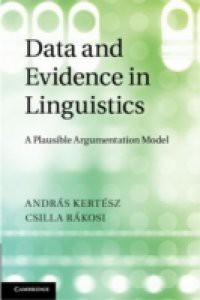The question of what types of data and evidence can be used is one of the most important topics in linguistics. This book is the first to comprehensively present the methodological problems associated with linguistic data and evidence. Its originality is twofold. First, the authors' approach accounts for a series of unexplained characteristics of linguistic theorising: the uncertainty and diversity of data, the role of evidence in the evaluation of hypotheses, the problem solving strategies as well as the emergence and resolution of inconsistencies. Second, the findings are obtained by the application of a new model of plausible argumentation which is also of relevance from a general argumentation theoretical point of view. All concepts and theses are systematically introduced and illustrated by a number of examples from different linguistic theories, and a detailed case-study section shows how the proposed model can be applied to specific linguistic problems.

